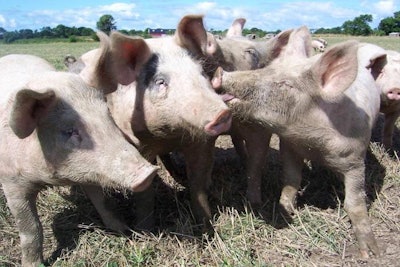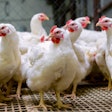
The West African republic of Togo has confirmed its first cases of ASF in domestic pigs, while Namibia and South Africa have reported new outbreaks.
First ever cases of African swine fever (ASF) have been reported in the Togolese Republic. Around 40 pigs have died at a farm in Assahoun, according to Republique Togolaise. The county is located in Avé prefecture in the southernmost region of Maritime in the West African state.
After confirmation of the infection, the minister in charge of animal husbandry announced a series of measures to prevent the further spread of the disease. These included the slaughter of all pigs at farms surrounding the outbreak, and the destruction of all pig-related products. After disinfection, restocking of farms can only occur after a fallow period of six months. In the meantime, movements of all live pigs, feed and equipment in the area are banned.
Farmers will receive financial compensation for animals that have been culled under veterinary direction. Production may only restart after ministerial authorization.
While no source of infection is identified in the report, ASF was confirmed in the neighboring state of Ghana in September 2019.
ASF returns to Namibia, South Africa
After an apparent absence of almost one year, ASF has returned to Namibia, leading to the loss of more than 200 pigs in the north of the country.
At the end of April, a cluster of outbreaks occurred in the Omusati region, according to the agriculture ministry report to the World Organisation for Animal Health (OIE). The virus was then detected at a small farm in the neighboring region of Kunene about one week later. Affected pigs were reported showing signs of diarrhea, vomiting, inappetence, sudden death, and typical skin lesions and discoloration.
The source of the infection in Namibia is described as vectors on the official report, which shows the outbreak to have occurred near to the border with Angola.
In South Africa, ASF was reported on May 10 in what the official report describes as a “village herd” of 40,000 pigs in Eastern Cape Province. Eight of the pigs died, according to the agriculture department’s report to the OIE. The virus was last detected in this region in February.
During the first week of April, ASF has also recurred in the Mpumalanga region of South Africa. Three of the 234 pigs on the farm in Lekwa municipality died.
Presence of the ASF virus was subsequently confirmed, bringing the total outbreaks to 19 since April 2019. The most recent confirmed outbreak in this series was in the same municipality in November 2019. Previous cases were reported elsewhere in Mpumalanga, as well as in Gauteng, Free State and North West Province.
All South Africa’s recent ASF outbreaks have occurred outside the national ASF control zone, according to the official report.
Other African states that have reported ongoing ASF outbreaks to the OIE are Cote d’Ivoire (Ivory Coast), Ghana, Kenya and Sierra Leone.
New outbreaks in Romanian backyard pig herds, European wild boar
Over the past week, Romania’s veterinary authority has reported 10 new outbreaks of ASF in domestic pigs. Infection was confirmed between April 25 and May 4. Affected herds ranged in size from one to 13 animals, and were distributed across the country. A total of 64 pigs were affected by these latest outbreaks.
Of the European countries, Hungary continues to report the highest losses of wild boar to ASF. The toll for the past week is 143, according to official reports to the OIE. Also reporting new cases were Romania (20 animals), Moldova (6) and Latvia (3).
Ukraine: ASF ‘resolved’
Ukraine’s animal health agency has reported to the OIE that the ASF situation has been “resolved” in Kirovohrad. The move comes after confirmation of a single outbreak of the disease among backyard pigs in the central oblast at the end of March.
View our continuing coverage of the global African swine fever situation.
















